Net-Zero Heroes: Eileen McGinnis & Lizett Sanchez
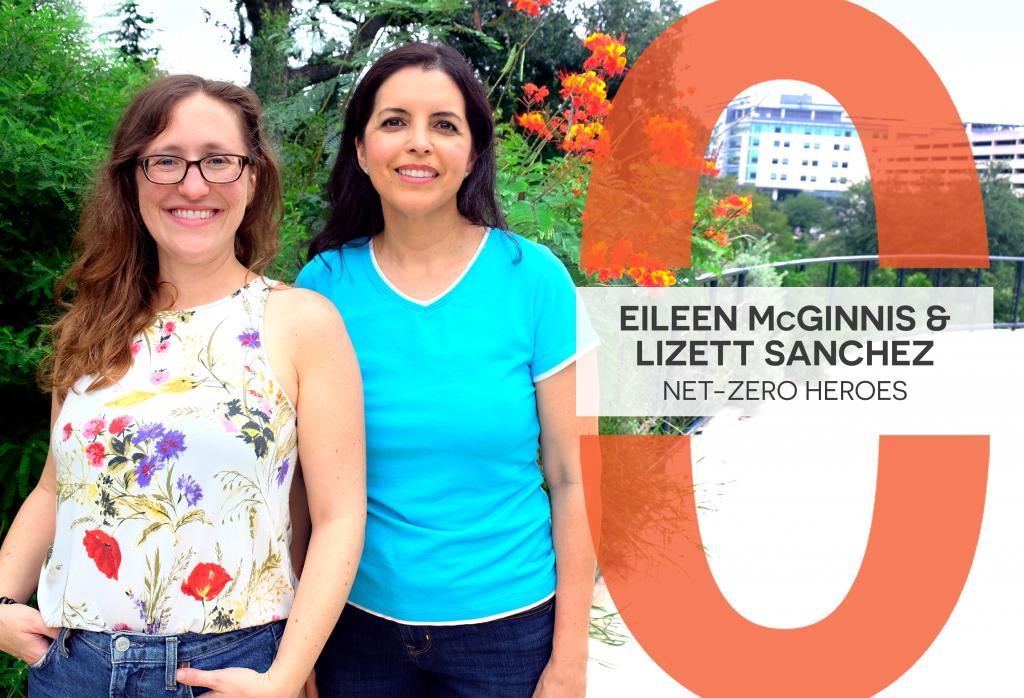
We’re helping to make Austin Net-Zero by engaging parents, caregivers, and families in the local climate movement.
In the past few years, we’ve seen many examples of youth organizing for climate justice. From the global Fridays for Future movement to young Austinites organizing with the Austin Chapter of Students for Climate Action, the efforts of young people have been rightfully elevated.
Our newest Net-Zero Heroes, Eileen McGinnis and Lizett Sanchez, were inspired by these stories and by the young people in their lives. Together, with a team of fellow volunteers, Eileen and Lizett lead The Parents’ Climate Community, a local Austin group dedicated to “putting love for our kids at the heart of climate action.” Eileen started the group in the summer of 2019 and Lizett has been involved since the very first meeting. Through their efforts, The Parent’s Climate Community supports local parents and caregivers in their efforts to engage in climate action by sharing resources, hosting events, and creating ways for them to connect.
We met with Lizett and Eileen at Waterloo Greenway to discuss how The Parent’s Climate Community began, how to talk to kids about climate change, and what advice they have for other parents and caregivers.
What inspired you to take action?
Eileen: Youth climate activists! In Spring 2019, as I was beginning to get involved in local environmental action following the devastating 2018 IPCC report, I attended a youth-led protest at the Texas State Capitol. I realized that young people were shouldering so much of the burden around climate. As an adult spectator, I felt saddened and ashamed. On the bus ride home, I googled “parent climate groups” but couldn’t find anything local. It took a few months to put the idea into action, but The Parents’ Climate Community was born that day.
Lizett: For me, the climate crisis has always been a big concern, but when I had my children, the crisis became much more alarming. I now have my children’s future to worry about, and that is what drives me to become more active and push for change. I also want to instill an interest in sustainable development and activism in my children. What better way to teach a child than by setting an example?
Eileen: There are many reasons why caregiver voices need to be a part of the climate movement. We are natural allies to stand in solidarity with youth. We have a deeply personal motivation to ensure that the future is livable for kids. And we’ve seen historically that when parents get fired up on issues — from drunk driving to gun control — we can make a powerful emotional appeal for change.
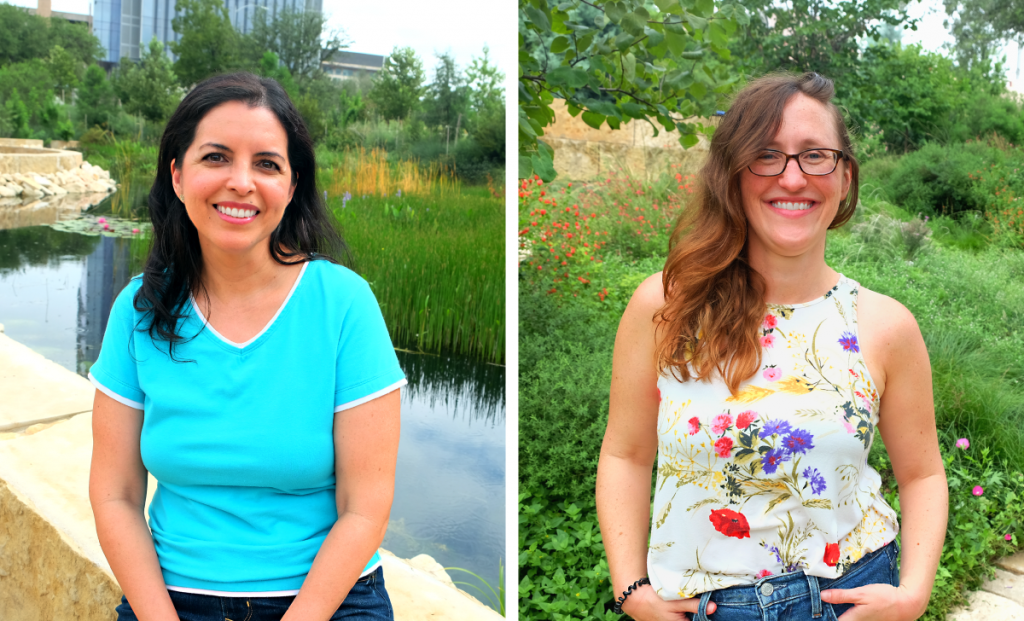
Lizett (left) and Eileen (right) at Waterloo Park.
How did you do it?
Eileen: In Summer 2019, I set up an account on Meetup.com and announced our first Parent’s Climate Community event. I recall sitting at the coffee shop nervous that no one would actually show, but now, over three years later, two of those original attendees, including Lizett, are active volunteers!
While we’ve had to adapt many times in various stages of the pandemic, our overall approach has been to focus on doable, local actions that make sense for busy parents. This came out of my own early experiences in the Austin climate movement. I would look around at meetings and observe that caregivers like me were missing from the conversation because those meetings took place during dinner and bedtime on weeknights. I wanted to create a group that was more accessible to caregivers.
We schedule meetups on weekends, and we design events that either actively engage kids or take place at venues like playgrounds and parks where children can easily be in the mix. Through our Facebook group and newsletter, we also link members to actions, like online surveys or petitions, that they can complete on their own time.
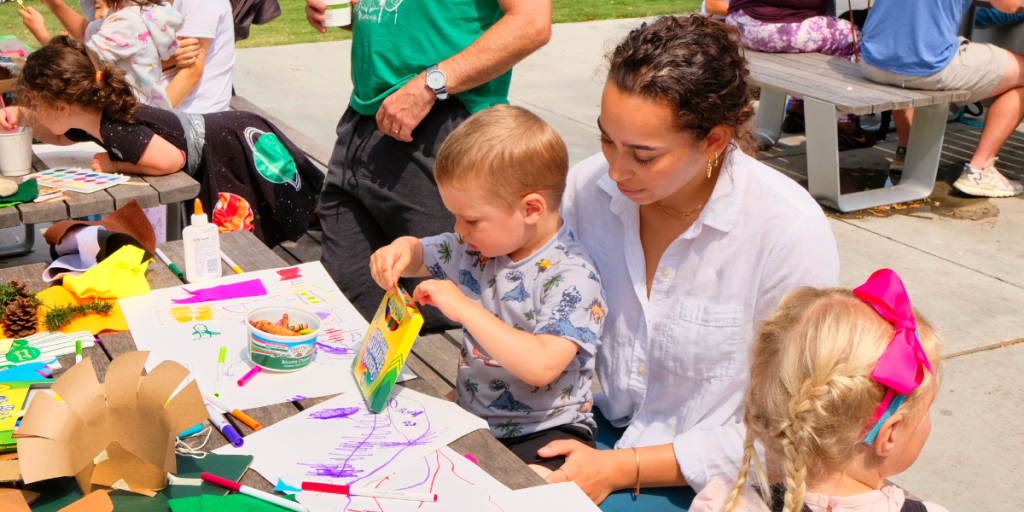
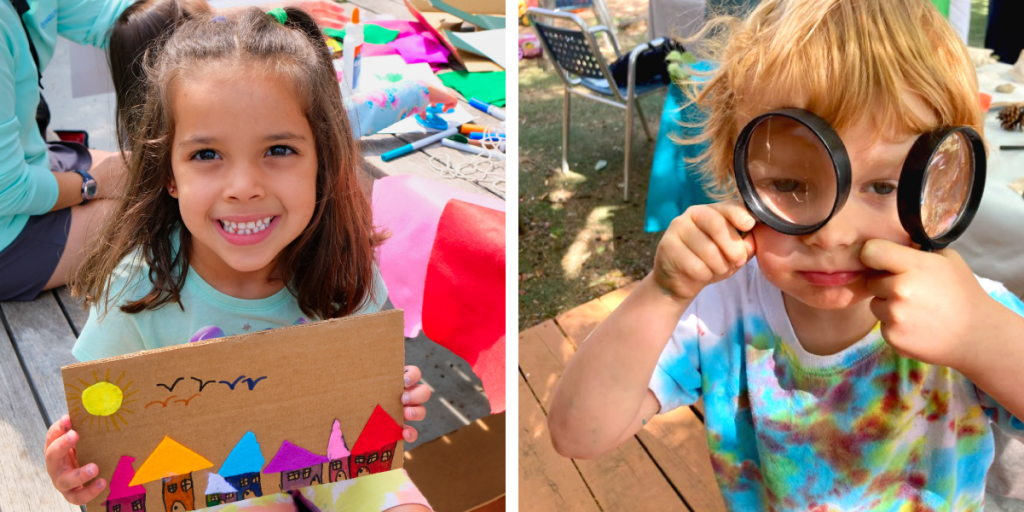
Photos from The Parents’ Climate Community meetups. Photos courtesy of Dana from Rethink35 (top and bottom left) and Eileen McGinnis (bottom right).
Lizett: Eileen is the driving force behind this group. I joined the group from the beginning. Despite launching shortly before the pandemic, Eileen did a great job keeping the group together during the shutdown. She continued to schedule virtual meetings during this time, which helped members to not lose sight of our purpose.
Social media has also been a great tool in letting others know about this group. Slowly, we have built up a small following on Facebook of dozens of parents and caregivers. Keeping an active schedule and collaborating with other local, non-profit organizations has helped tremendously in getting exposure and increasing our membership.
Eileen: As Lizett mentioned, collaborations with local non-profits like Ghisallo Cycling Initiative, Families in Nature, Austin Allies, Ecology Action, and Rethink35, among many others, have been crucial to growing our visibility. These partnerships help us connect parents and families with the already robust nature education and environmental advocacy movement here in Austin.
I know the word “community” can sound cheesy or be used in shallow or even misleading ways, but being a community has been key to keeping our group active and growing. Without the volunteer hours, energy, skills, creativity, and connections of my Parent’s Climate Community teammates — Lizett, Zephyr, Lesa, Olya, Denise, and Kate — I would still be that nervous meetup organizer waiting alone in a coffee shop, wondering if anyone would show up.
What’s been most rewarding about getting involved in this way?
Lizett: Having the opportunity to participate in our activities and events with my children. Seeing them develop an interest and ask me questions about our group brings such a feeling of satisfaction and motivates me even more to keep it up.
Eileen: The feeling of connection and the relationships that have come out of organizing around kids and families. Aside from new friends like Lizett here in Austin, I’ve also gotten to know parent climate organizers in places like Missoula, Montana, and Cape Town, South Africa through Our Kids’ Climate, an international network of parent-led climate groups.
Raising kids can be an incredibly lonely and isolating endeavor. The Parents’ Climate Community believes that coming together for climate action can also be a means of addressing our own needs as adults for socialization, friendship, and support.
Lizett: Connecting with other parents that share the same beliefs has also been really enjoyable for me. Talking about the climate crisis at playdates and birthday parties isn’t exactly a social norm, so meeting other parents that understand and feel the same way helps me feel that these beliefs are valued and important.
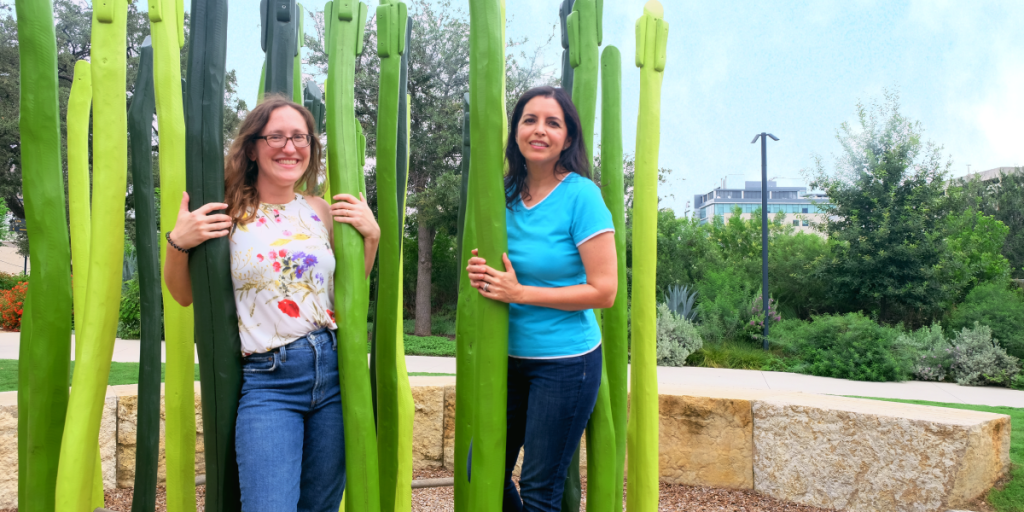
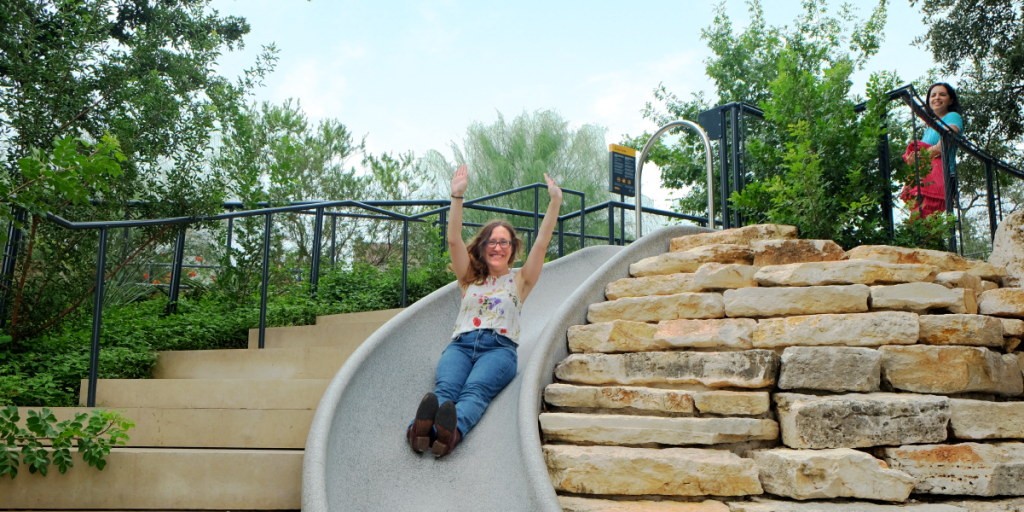
Eileen and Lizett explore the nature-based playground at Waterloo Park
What’s been the toughest part?
Lizett: Well, certainly the pandemic didn’t help, but luckily we were still able to meet virtually.
Eileen: Yes, we were a very young group, less than a year old, when the pandemic started. So many demographic groups, of course, were challenged by the pandemic, and caregivers were certainly among them. I remember one low point in 2020 when Lizett and I were the only attendees at a virtual event we’d planned on kids’ public health and climate, and we both had a moment of doubt about whether or how to keep going.
The pandemic surfaced systemic issues and inequalities that were already present around raising kids in the US. The challenge of organizing parents and guardians is that we are already so slammed with the day-to-day realities of keeping kids alive and helping them thrive. We need universal childcare, better parental leave policies, and livable wages for professional care workers, along with a culture shift to make raising kids a more collective endeavor and to free up the space for parents to engage in civic life.
Lizett: Time is always an issue. Parents are so busy, so it can be a little bit of a challenge to get a large turnout at some events. Our Facebook group has been instrumental in our ability to continue communicating with our members when they are not able to make it to events.
Recent studies have shown the impact of climate anxiety on our world’s youngest generations. Are there tips you can share for parents on how to talk to their children about climate change or other tools that can be used to help children cope with this topic?
Eileen: Yes! The topic of youth eco-anxiety and the impacts of extreme weather on young people needs so much more discussion! The Parents’ Climate Community did a couple of workshops this year with Austin-based eco-aware therapist Dr. Anna Graybeal. Her advice, riffing on the airplane safety announcement, was to “put on your own mask first.” In other words, we as adults need to process our own emotions — grief, anger, sadness, powerlessness — around climate change. This will cultivate a spirit of openness and invitation when it comes to talking with kids and teens. They need to know that the climate crisis is not a taboo topic at home.
Lizett: I agree. Developing and maintaining an open line of communication with children is important. We need to give children a safe space to express themselves, ask questions, and allow them to share their feelings.
I also think that it’s important to teach our kids that there are steps they can take to help the environment and the cause. That is where this group comes in. Teaching about activism and providing caregivers with educational resources can make them feel less helpless and actually empowered to get involved. There are also a lot of resources online that provide parents with tools and strategies to help children with anxiety over the climate crisis.
Eileen: For those looking to learn more, I would encourage families to check out The Parents’ Climate Community’s Guide to Talking with Kids About Climate Change (available in English and Spanish).
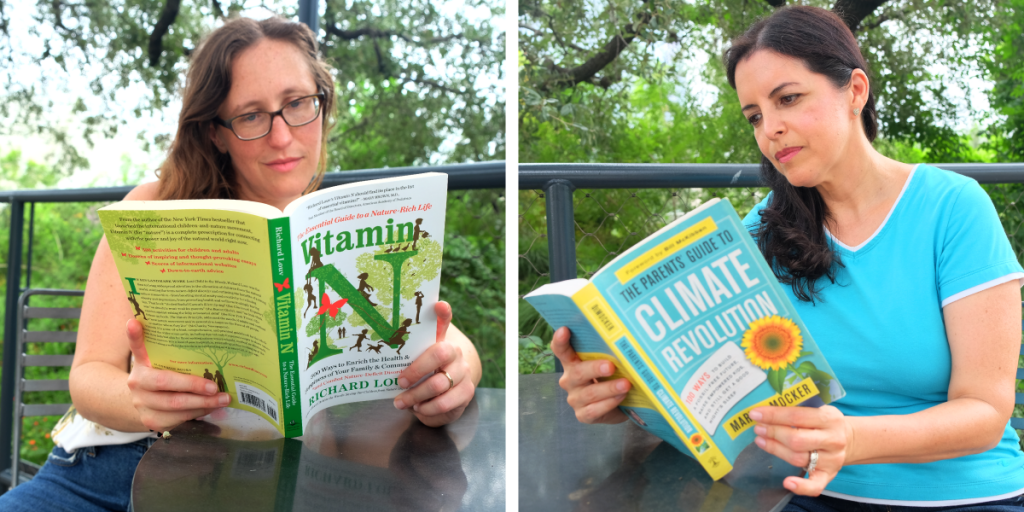
Eileen and Lizett reading some of The Parents’ Climate Community's recommended books
Is there a book, documentary, or other piece of media you would recommend for folks wanting to learn more about these topics?
Eileen: The one book I would press into all caregivers’ hands is The Parents’ Guide to Climate Revolution. Mary DeMocker, a climate organizer, writer, and consultant based in Eugene, Oregon, offers a collection of 100 easy ideas, often organized by time commitment, for engaging in climate action as a parent or guardian. A phone conversation I had with Mary early on really encouraged me as The Parents’ Climate Community got started.
Lizett: An Inconvenient Truth was a very powerful documentary on the climate crisis. It presented such an impactful message that it became a blockbuster, international sensation — a status most documentaries don’t typically reach. If you haven’t watched it already, you really should.
2040 is another great documentary. It gives amazing stories of people and organizations from around the world that have actually developed ways to reduce emissions and supported other actions to help the environment. It made me feel hopeful — there is still so much to be done, but our actions today will determine how much can actually happen.
Eileen: I would also recommend checking out the documentary Youth v Gov on Netflix. It tells the story of the 21 remarkable youth plaintiffs involved in Juliana v. United States, the landmark climate justice case.
What advice do you have for others?
Lizett: SMALL STEPS. If all parents and families just take small steps towards becoming agents of change, it could lead to bigger accomplishments in helping the cause of climate change.
But we can’t take small steps if we don't know the facts. Try to educate yourself a little bit on the climate crisis. Learn about organizations that you can volunteer for or donate to. There are lots of ways to really build up this movement.
Eileen: Connect with others! While individual household actions around sustainability certainly have meaning and instill important values in our kids, we need more grassroots engagement around climate solutions in our schools, neighborhoods, and cities. Find a local group or a local chapter of a national organization and get involved. If they don’t have a family-friendly set-up, advocate for change: ask them about providing childcare at monthly meetings, or offer to help plan a playground event that would be inclusive of families with young kids.
Acting together doesn’t only lead to system-level change — it also feels good! A lot of parents are worried about the climate crisis, but that can sometimes manifest as lying awake at 2:00 AM in a panic. It helps not to be alone with those worries. Talking about our fears with like-minded adults and taking action alongside our kids and community members can shift the narrative and provide a sense of agency.
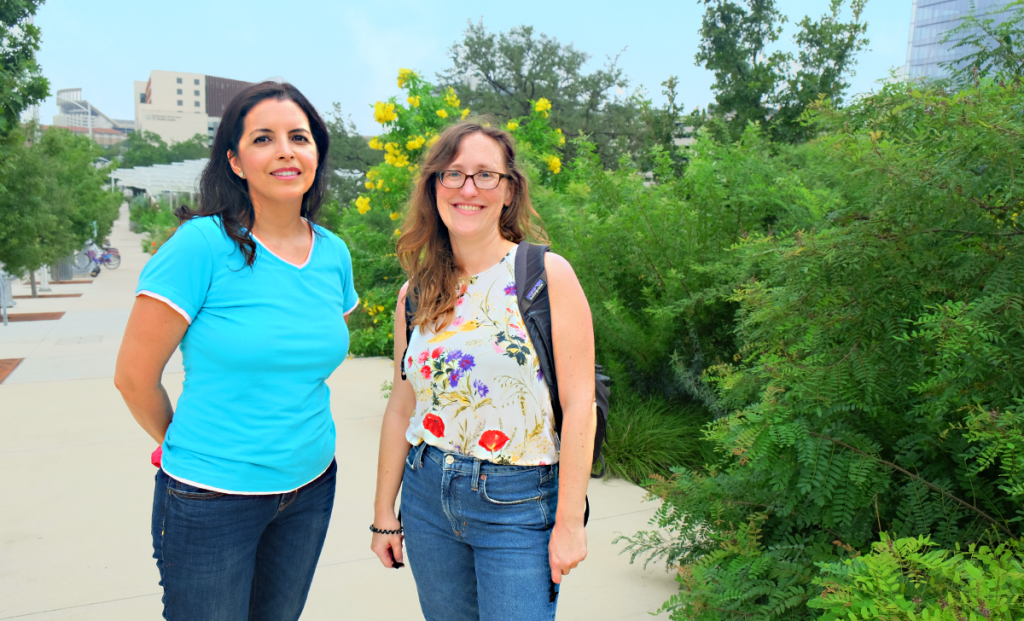
Are you interested in joining The Parents’ Climate Community? Find them on Facebook or Meetup.com. You can also sign up for their newsletter.
To learn more about Austin's net-zero goal and explore actions you can take to support a greener community, view the Austin Climate Equity Plan.
Share your Net-Zero contributions with us on X (formerly Twitter) or Facebook, and use #NetZeroHero. If you know a Net-Zero Hero (or heroes!) who should be recognized for their efforts, send your nomination to climate@austintexas.gov.

